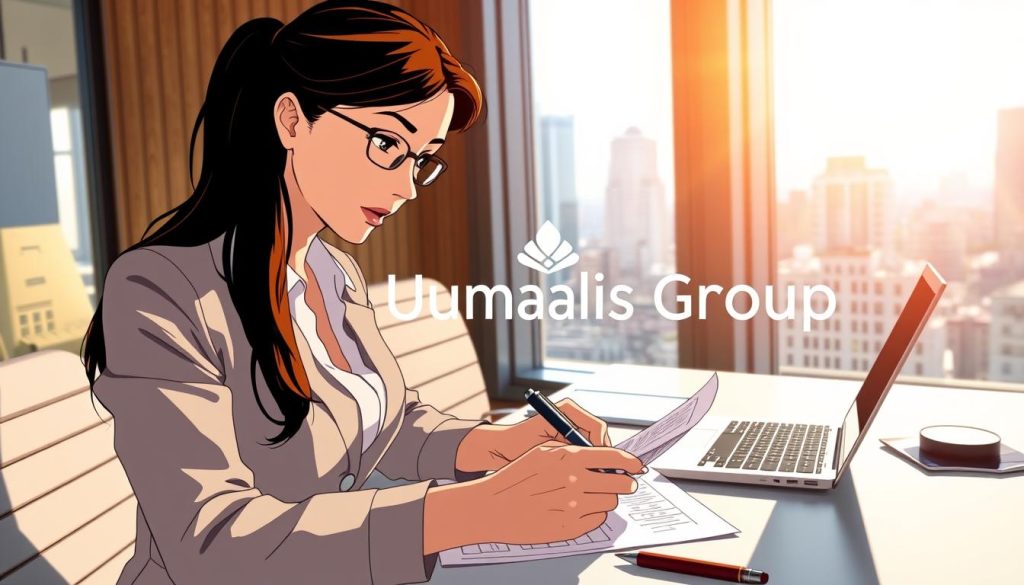Fact: Nearly one in four professionals in France now earns part of their living outside traditional employment, reshaping how tax and security apply.
We set the stage for your path as an independent contractor in France with clear rules and practical steps. The state defines status by the absence of subordination: you set your schedule, use your tools, and can serve multiple clients.
This short guide explains key choices — from micro-entrepreneur or EI registration to when a company structure suits growing income. It covers the must-have identifiers, such as SIREN/SIRET, and invoice rules so your services get paid on time.
We also highlight risks of misclassification, planning for progressive income tax and french tax obligations, and when a profession libérale visa or separate account matters. Follow these steps and you gain both freedom and security for your work across the year.
Table of Contents
Key Takeaways
- Know the status signs that define an independent contractor in France.
- Choose the right legal form early to limit tax and social charge surprises.
- Use SIREN/SIRET and complete invoices to ensure timely payment.
- Plan for progressive income tax and URSSAF social charges from day one.
- Separate finances and watch PACTE thresholds to keep your security.
How France Defines an Independent Contractor Today
French law draws a sharp line between service autonomy and employer-like control when deciding work status. The decisive test is simple: is there subordination? If a client gives orders, controls execution, or can sanction, the relationship may be employment rather than freelance.
Subordination vs. autonomy: the decisive legal test
Courts rely on three core signs: orders, monitoring, and sanction power. The French Supreme Court framed this test in Cass. Soc., 13 Nov 1996, n° 94-13187.
Court-backed signals of employment misclassification
Judges weigh multiple factors together. They look at fixed hours at the client’s site, exclusive service, use of the company’s equipment, and integration into internal teams.
- Practical tip: favour deliverables over time-based control in your contract.
- Keep your SIREN/SIRET number, independent invoicing, and insurance to support your commercial profile.
- Understand that requalification risks social security and tax liabilities for both the worker and the company.
Independent contractor France: visas, residency, and who needs what
Before you invoice a company, check visa rules and registration routes that affect your legal right to provide services.
If you are not a French or EU/EEA/Swiss citizen, plan for the « profession libérale » long‑stay visa. Prepare a clear services plan, projected income, and supporting documents showing market demand and qualifications. These materials prove autonomy and economic viability to the consulate.
EU/EEA/Swiss citizens and French nationals do not need a visa, but they must complete registration to work legally. Registration issues a SIREN/SIRET and an activity code (EPA) so you can issue compliant invoices and handle tax and social obligations.
How to choose the registration route
Use the URSSAF micro portal for micro‑entrepreneurs to get started quickly. For broader business activity or regulated services, route registration via INPI or the relevant professional registry. Some activities require diplomas or permits at registration; address these early to avoid delays in your first year.
Residency, tax rules, and banking
Tax residency differs from visa residency: your income tax position depends on where you live and where the income is sourced. Keep records that support filings and plan cross‑border reporting if applicable.
« Open a French bank account after registration to streamline client payments and reduce international fees. »
- Timing tip: align onboarding, registration, and first invoices so work starts after legal setup.
- Structure note: match micro vs EI to your expected income and services to limit future tax surprises.
- Next step: read our practical guide on working in France as a freelancer for registration details: working in France as a freelancer.
Choose your business activity category before registration
A clear activity choice steers you to the right register and defines documentation and insurance needs.
Artisan, liberal professional, or merchant: why it matters
France sorts self-employed roles into three main categories: artisans for craft and manual trades, liberal professionals for intellectual or regulated services, and merchants for buying and selling goods.
Each category routes your file to a different register and sets distinct obligations. Artisans often go to the RNE and may need diplomas. Merchants register at the RCS. Liberal professionals usually follow BNC rules for tax and services.
- Mixed activities: track revenue per activity and state the split at registration to avoid later tax questions.
- Compliance: regulated professions must supply credentials, orders, or chamber membership to complete registration and get a SIREN number.
- Practical effects: your chosen category shapes insurance needs, VAT treatment, and how clients vet your company.
We recommend documenting the scope of your business activity and keeping receipts by activity. You can update the classification as your work evolves, but do so before signing new contracts to limit disruption.
Pick the right legal structure for your freelance business
Your business structure shapes taxes, liability, and how clients perceive your services.
At low turnover, the micro-entrepreneur regime simplifies registration, declarations, and tax withholding. It suits sole activity with predictable income and limited overhead.
The individual entrepreneur (EI) keeps you as a single owner while separating some professional assets. EI may be preferable when you expect higher income or want clearer accounting for social security contributions.
Micro-entrepreneur vs. individual entrepreneur (EI)
Key differences focus on reporting, thresholds, and protection.
- Micro-entrepreneur: simplified tax, flat-rate contributions, franchise thresholds (€188,700 commercial; €77,700 services).
- EI: fuller accounting, option to separate business patrimony, different social security contributions and tax treatment.
When SARL or SNC makes sense
Choose a SARL (or EURL for single owners) when you need limited liability and clearer governance. A SNC works for partners who accept joint liability for higher-risk contracts.
Companies often reassure larger clients and ease bank account and financing access. They also change how tax and social security contributions are calculated.
Moving from micro to EURL/other structures
Crossing turnover thresholds, taking partners, or seeking liability limits usually triggers a move to EURL or SARL. Plan the migration to avoid interruptions in VAT, invoices, and client contracts.
« Assess tax efficiency, liability protection, and operational complexity for the next 12–24 months. »
| Structure | Best for | Tax & contributions | Liability |
|---|---|---|---|
| Micro-entrepreneur | Low turnover, simple activity | Flat social charges, simplified tax | Personal liability |
| EI | Solo professional, clearer accounting | Progressive tax options, social security contributions per regime | Limited via patrimoine d’affectation |
| SARL / EURL / SNC | Growth, partners, higher-risk contracts | Corporate tax or income tax options; formal payroll and contributions | Limited (SARL/EURL) or joint (SNC) |
We recommend mapping expected income, client expectations, and liability needs before you register independent contractor status. Update your bank account, SIREN number, and invoice templates as you change forms to keep bookkeeping clean.
Register independent contractor in France: step-by-step
Start with a clear route: registration determines your tax regime, your number identifiers, and which registry holds your file.

INPI routing and SIREN/SIRET issuance. You declare your activity through INPI which routes artisans to the RNE and merchants to the RCS. The filing notifies tax authorities and assigns your BIC or BNC category. Within days, you receive a SIREN and SIRET number to use on invoices and contracts.
URSSAF portal for micro-entrepreneurs
Micro-entrepreneurs can complete registration online at autoentrepreneur.urssaf.fr.
The portal accepts identity, proof of address, and a short business description. It also opens your URSSAF account so you can manage social security contributions and tax declarations without in-person steps.
Required documents and regulated activities
Prepare these items before you submit:
- Photo ID and proof of address.
- Business description and activity code.
- Credentials or diplomas for regulated activities.
- Optional professional insurance certificate and bank account details.
Timing and common pitfalls. Expect a short wait to receive your numbers. Start dates matter: set your work start date after registration to avoid tax and social security gaps. Watch activity labels and holder names on bank accounts to prevent mismatches.
| Step | Action | Outcome |
|---|---|---|
| Declare via INPI | Submit activity details | Routing to RNE/RCS and tax notification |
| Register on URSSAF | Upload documents online | URSSAF account created; social contributions linked |
| Receive identifiers | Get SIREN / SIRET | Use on invoices, contracts, and tax forms |
| Integrate systems | Link accounting and invoicing tools | Compliant invoice numbering and tax records |
« Keep records aligned across INPI, URSSAF, and your accounting system to reduce tax errors and simplify declarations. »
Independent contractor invoicing that complies with French rules
A robust invoice is both a commercial tool and a legal document you must respect. It records the sale of services, supports your tax position, and helps clients pay on time.
Mandatory invoice fields and numbering
Every invoice must include: “Facture” title, your company identity, client details, SIREN/SIRET if applicable, issue date, unique sequential number, and the service description with HT, VAT rate, and TTC totals.
Ensure the numbered sequence has no gaps and uses a continuous system by year. Gaps or duplicates attract questions in audits.
When to use “TVA non applicable, art. 293 B du CGI”
If your activity benefits from the franchise en base (no VAT collected), add the exact legal phrase: TVA non applicable, art. 293 B du CGI.
Remove that statement once your turnover crosses the VAT threshold and you begin charging VAT. Keep records showing the date of change.
Late payment penalties and legal mentions
Display payment due date, late payment interest rate (or reference legal rate), and the fixed recovery cost mention (€40 or current legal figure). Add professional insurance or registration lines if your activities require them.
- State bank account details that match your registered account.
- List deliverables, hours, or milestones clearly to link income to services provided.
- Issue corrective invoices or credit notes while preserving number continuity.
| Item | What to include | Why it matters | Example |
|---|---|---|---|
| Identification | Company name, address, SIREN/SIRET | Proves taxable entity and supports statements | Acme Services – SIREN 123 456 789 |
| Pricing lines | Description, quantity, unit price HT, VAT, TTC | Shows taxable base and VAT treatment | Consulting 10h × €80 HT = €800 HT |
| VAT status | Either VAT rate or “TVA non applicable, art. 293 B du CGI” | Clarifies whether VAT applies to the sale | TVA non applicable, art. 293 B du CGI |
| Payment terms | Due date, late interest, recovery costs | Strengthens collection rights and deterrence | Due 30 days – legal interest + €40 recovery fee |
Good practice: link each invoice to an approved estimate or order number. That simplifies client approval and speeds payment.
Compliance checklist: verify identity lines, unique number, correct VAT statement, payment account, and any activity-specific mentions before sending.
How to get paid and manage clients across borders
Getting paid across borders requires clear terms, the right payment rails, and predictable timelines. Define currency, fees, and payment windows in the contract so clients know expectations up front.
Choose methods that protect your margin. SEPA transfers into your bank account are low-cost for euro payments. Card processors and wallets (PayPal, Wise) speed receipt but can add conversion fees.
- Structure billing: state currency, VAT or tax treatment, and invoice language to speed approvals.
- Batch invoices: group by company and country to simplify reconciliation and reduce bank fees.
- Track work and time: use milestone invoices for long projects to secure partial income and reduce risk.
Forecast cash flow across the year and build a buffer for client payment cycles. Use a central dashboard to reconcile invoices with your bank account and spot overdue clients early.
« Standardized templates and clear payment rails reduce disputes and hidden costs. »
Tax note: cross-border services can trigger reporting or permanent establishment concerns. Ask an adviser when repeat work occurs in one country.
Separate bank account rules and the PACTE law threshold
When revenue grows, banking rules step in: the PACTE law requires micro-entrepreneurs who exceed €10,000 in turnover for two consecutive years to use a separate bank account for professional receipts and payments.
A personal checking account is acceptable if you keep it for business use only and keep transactions distinct. Make sure the account number appears on invoices and matches receipts to ease reconciliation and tax audits.
Legal entities (SA, SAS, SARL, SNC) must open a formal business bank account from day one. Choose banking services that fit your payment volume, international transfers, and fraud protections.
- Quick checklist: open the account after a quiet billing period; update invoices with the new number; move recurring payments.
- Keep a reserve in the account for social charges and tax to avoid surprises at year-end.
- Prepare ID, SIREN/SIRET, proof of activity, and recent invoices for bank onboarding to speed approval.
« Separating accounts improves audit trails, simplifies tax reconciliation, and reassures clients who ask for bank attestations. »
Understanding progressive income tax for self-employed
Knowing which tax category applies to your work changes how much of your revenue becomes taxable income.
France uses a progressive income tax scale rising to 45%. Your taxable base depends on whether your activity falls under BIC (commercial or craft) or BNC (liberal professions).
BIC vs. BNC: how regimes affect your taxable base
BIC typically covers merchants and craftsmen. Micro allowances can be 50% for service-type BIC or 71% for goods sales, reducing the amount subject to personal income tax.
BNC applies to professional services and often benefits from a 34% allowance under the micro regime. These allowances are applied before calculating your personal income tax.
Allowances, versement libératoire, and residency impacts
Versement libératoire lets eligible micro-entrepreneurs pay income tax as a flat percentage on turnover, simplifying receipts and social security contributions planning.
- Residents pay tax on worldwide income; treaties often reduce double taxation.
- Non-residents pay minimum French rates on French-sourced income (e.g., 20% up to threshold, 30% above).
- Set aside quarterly reserves in your business account for tax and social security contributions to avoid cash shortfalls.
« Track activity changes carefully: moving from micro to the real regime alters allowances and documentation required at filing. »
Social security contributions and your URSSAF obligations

URSSAF collects social security contributions that fund your health, family, and pension rights. You must declare turnover under the micro‑social regime and pay flat-rate contributions based on activity.
Choose monthly or quarterly reporting when you register. Monthly gives tighter cash management; quarterly eases admin if income is irregular.
Micro-social reporting cadence
Report gross turnover on your URSSAF online account. The platform lets you file declarations, view statements, and schedule payments to match your cash cycle.
If you make an error, correct the declaration promptly via your URSSAF space. Adjustments update future contributions and recalculated tax social balances.
First-year relief and where to manage payments
New micro-entrepreneurs may qualify for first-year relief that reduces initial charges (often up to 50% for qualifying cases). Apply through URSSAF when you register or from your online dashboard.
| Topic | Option | Effect |
|---|---|---|
| Reporting rhythm | Monthly / Quarterly | Cash flow control vs. admin ease |
| First-year relief | Apply via URSSAF | Lower early-year contributions and tax social burden |
| Missed deadline | Late filing / contact URSSAF | Interest, remedy plan, restore standing |
- Keep payments and client receipts organised by period so year totals reconcile with URSSAF statements.
- Set automated reminders and keep a buffer in your business account for expected contributions and tax.
- Note: leaving the micro regime changes how social security and contributions are calculated and increases record keeping.
« Maintain aligned records and a payment routine to avoid surprises and protect your social rights. »
VAT for independent contractors in France
Understanding VAT rules helps you avoid sudden tax bills and keep client billing clean.
Overview: The standard VAT rate is 20%. Reduced rates—10%, 5.5%, and 2.1%—apply to specific supplies and some exemptions exist for particular services and goods.
Thresholds, rates, and the franchise en base
Small activities may qualify for the franchise en base. If you remain below the turnover thresholds for your activity, you state “TVA non applicable, art. 293 B du CGI” on invoices and do not collect VAT.
When turnover approaches the threshold, monitor monthly totals so you do not accidentally breach the limit.
Crossing the line: when to register and charge TVA
Once you exceed the applicable threshold, you must register for VAT, obtain the VAT number, and charge TVA on French sales.
Update invoices immediately: remove the “TVA non applicable” clause, show VAT amounts, and apply the correct rate.
- Configure your invoicing tool to select rates by service and track VAT collected versus input VAT.
- For cross-border services, apply place-of-supply rules and, where relevant, the reverse charge mechanism.
- Keep clear records for credit notes and corrections if VAT was misapplied.
Practical tip: align VAT reporting cycles with your bank account reconciliations. Monthly checks protect liquidity and reduce year-end tax surprises.
« Plan a VAT readiness checklist as your pipeline grows so registration and client communications stay seamless. »
Accounting, statements, and staying audit-ready
Good bookkeeping keeps your business ready for review and reduces year‑end surprises. Build a lean accounting routine: an income log, clear expense records, and monthly reconciled bank statements. Maintain a strict invoice number sequence to avoid compliance flags.
Keep a receipt book (livre de recettes) if you are under micro regimes or when a bank requests supporting documents. Record date, client, amount, and linked invoice number. This simple book supports your tax filings and any audit requests.
Categorise expenses by activity to show deductible costs. Save supplier invoices, payment proofs, and client remittance advices. Retain URSSAF and VAT statements together with monthly bank statements so cash received ties to issued invoices.
- Quarterly close: reconcile invoices, set aside contributions, and update tax accruals.
- Controls: enforce sequential numbers for invoices and credit notes; log any corrections.
- Security: use cloud backups and access controls to protect records from loss or tampering.
| Record | What to keep | Why it matters | Action |
|---|---|---|---|
| Income log | Invoice number, client, date, amount | Proof of income for tax and cash flow | Reconcile monthly with bank account |
| Expenses | Receipts, supplier invoices, category | Supports deductions and limits disputes | Attach digital copy to each entry |
| Statements | URSSAF, VAT, bank statements | Links taxes due to cash received | Archive per quarter and year |
| EU services | Déclaration européenne de services proofs | Verifies cross‑border activity and VAT treatment | Keep contracts and transmission logs |
When to use a separate bank account: it becomes necessary after the PACTE threshold or when you prefer clearer reconciliation. Even before that, a dedicated bank account simplifies year‑end summaries and protects personal finances.
« Close each quarter, document every number, and keep records ready for review — it saves time and protects your tax position. »
We recommend a simple year‑end checklist: reconcile totals, summarise income and expenses, archive receipts, and prepare statements for your accountant. Follow these steps and your company files will remain audit‑ready while you focus on your work.
Liability, insurance, and protecting your personal assets
Your business structure directly shapes who answers for losses and how your personal assets are protected.
EI and company forms differ: an EI keeps some professional assets at risk, while a SARL or EURL usually separates personal wealth from company liability. Choose the form that matches your activities and income profile for the year.
Insurance complements law: a professional indemnity policy (responsabilité civile professionnelle) should be your baseline. In construction, add decennial cover where law or clients require it.
« Make indemnities payable by the company, not you personally, and record the company number on all policy documents. »
Practical contract points to include:
- Clear scope and acceptance criteria to limit disputes.
- Liability cap and exclusion for indirect damages.
- Data security obligations and limitation of remedies.
Plan premiums as deductible business expense and budget renewals into your cashflow. Keep certificates, endorsements, and claims history accessible for client due diligence.
- Assess risk by activity and price it into your fees.
- Insist client indemnities flow to the company.
- Push back on clauses that shift disproportionate liability onto you during negotiation.
| Item | Why it matters | Action |
|---|---|---|
| Structure choice | Sets legal exposure and creditor reach | Match SARL/EURL for higher-risk work |
| Basic insurance | Covers professional errors and third-party claims | Buy indemnity policy and list company number |
| Sector cover | Meets legal/client mandates (e.g., decennial) | Obtain endorsements and keep certificates |
Checklist before signing: verify policy names, the company number on documents, contract caps, and how premiums affect your tax filings. This short routine protects your assets and strengthens your commercial security.
Avoiding misclassification and converting to employment
Watch for small changes in daily routines—these often reveal when a services relationship is drifting toward employment.
Signals to monitor in client relationships
Common red flags: fixed hours, a desk at the company, direct reporting lines, long-term exclusivity, or use of client equipment. These factors invite legal scrutiny.
How to reduce risk and propose conversion
Document independence: keep a clear contract, invoice autonomously, use your tools, and define deliverables rather than time slots.
If creeping subordination appears, raise the issue early and propose tweaks: flexible hours, defined deliverables, or a services review every quarter.
- Reference the 2013 case where a ruled judgment awarded the equivalent of one year’s fees for inadequate notice; ensure termination clauses are explicit.
- Conversion checklist: salary benchmark, probation, seniority credit, IP and equipment handover, and agreed notice terms.
- Communicate changes calmly with the company, protect liability and give fair notice while negotiations proceed.
« Review contracts periodically and align written terms with actual practice to avoid costly reclassification and tax exposure. »
Advanced pathways: SCOPs, cooperatives, and growth moves
A SCOP model can transform how you invoice, get paid, and plan growth without forming a traditional company. It is a cooperative business where members share governance while a single legal entity handles admin.
How a SCOP handles payroll and collections: the cooperative issues payslips, collects client payments, and manages bookkeeping for a fee. That reduces time spent on admin and gives predictable monthly pay for members.
There are trade-offs. Fees and cooperative rules apply, and income distribution follows voting and reserve policies. We advise checking the fee schedule and how tax and social charges are calculated before joining.
Business benefits: simpler collections, standardised contracts, and stronger credibility with larger clients who prefer a single company to pay. Exit steps are usually defined so you can move to your own company later while keeping client continuity.
- Compare costs versus micro/EI: net administrative time saved, fees, and effective tax impact.
- Verify what number and legal identity appear on invoices and what clients will see.
- Confirm governance: voting rights, profit shares, and decision rhythm.
« Joining a SCOP can be a pragmatic growth move for contractors who want stability without full incorporation. »
Conclusion
You now hold a practical roadmap to set up, bill, and grow your work in France while keeping compliance front and centre.
We summarise the essential order: confirm autonomy, choose the right registration path (INPI/URSSAF), issue compliant invoices and use the “TVA non applicable, art. 293 B du CGI” line when eligible.
Plan cash by quarter and year, separate accounts when PACTE thresholds apply, and keep URSSAF declarations aligned with your records to avoid surprises on tax and social charges.
Protect yourself with appropriate insurance, clear contracts, and a growth plan — SCOPs or company structures if you need liability limits. Use this article as your reference so you can spend time where it matters: serving clients and securing steady income.
FAQ
What defines a self-employed professional under French law today?
In France the decisive test is the presence or absence of subordination. If you set your hours, use your own tools, and bear commercial risk you typically qualify as autonomous. Courts look at control, integration into the client’s organisation, and who directs daily work to decide on misclassification.
What signs do courts use to reclassify a service contract as employment?
Judges consider recurring directives from the client, exclusive dependence on one payer, provision of work tools or workplace by the client, and hierarchical reporting. Regular schedules, sanction powers, or being placed on internal rosters are strong signals of employment.
Do non-EU citizens need a specific visa to provide services from France?
Yes. Non-EU nationals usually require a long-stay visa or a profession libérale residence permit to carry out paid professional activity. Requirements include proof of qualifications, a realistic business plan, and sufficient resources.
Do EU/EEA/Swiss citizens have registration obligations in France?
EU, EEA and Swiss nationals benefit from freedom of movement but must still register locally when they start an activity: declare to URSSAF or the relevant Centre de Formalités des Entreprises and obtain SIREN/SIRET identifiers if required.
How do I choose between artisan, liberal professional, or merchant status?
Base the choice on the nature of your activity: crafts and manual trades often fall under artisan, regulated intellectual services under profession libérale, and commercial resale under merchant. The category affects taxes, social regime and required registrations.
Should I become a micro-entrepreneur or an individual entrepreneur (EI)?
Micro-entrepreneur suits low-complexity activity with turnover below thresholds and simplified accounting. EI allows for more deductible expenses and is preferable when income or costs exceed micro limits. Consider social charges, VAT and pension impacts.
When is forming an SARL or SNC appropriate?
Choose SARL/SAS when you want limited liability and clearer separation of personal assets, or SNC for partnerships where partners accept joint liability. These forms suit larger clients, hiring staff, or when growth and investment are planned.
How can I move from micro-entrepreneur to EURL or another structure?
Transitioning requires closing the micro regime or adapting bookkeeping, then registering the new legal entity with RCS or RSI routes. Timing matters for tax year treatment and social declarations; consult an accountant to manage asset transfer and liabilities.
What are the steps to register a professional activity in France?
Key steps: determine activity category, register with URSSAF or CFE, obtain SIREN/SIRET via INSEE after RNE/RCS filing, and if applicable register trademarks with INPI. Keep required ID, diploma attestations and proof of address ready.
Where do micro-entrepreneurs declare and pay social contributions?
Micro-entrepreneurs register and declare turnover on the URSSAF portal. Reporting can be monthly or quarterly. Payments are then calculated as a percentage of declared turnover via the micro-social system.
What documents prove authorization for regulated activities?
Regulated professions require diplomas, professional cards, or prior authorization from the relevant authority (chamber of trades, health agency, etc.). Always include these with your registration to avoid delays or sanctions.
What mandatory fields must appear on a French invoice?
An invoice must include seller and buyer IDs (name, address, SIREN/SIRET), invoice number and date, description of services, unit price and totals, payment terms, and applicable VAT statement or exemption mention.
When can I use “TVA non applicable, art. 293 B du CGI” on invoices?
Use this mention when your turnover is below the franchise en base VAT thresholds. It indicates you are not charging VAT. Monitor thresholds yearly—crossing them obliges VAT registration and collection.
What penalties apply for late client payments?
Late payment interest and fixed recovery indemnities apply by law. Invoices must state the interest rate and the flat-rate compensation amount. Contractual clauses cannot undercut statutory protection for creditors.
How can I get paid by foreign clients and manage cross-border VAT?
For EU clients use reverse charge rules when applicable and collect their VAT number. For non-EU clients invoice without VAT if services are exported. Use SEPA, international transfers or payment platforms, and keep FX and withholding tax rules in mind.
When is a separate bank account required under the PACTE law?
Since PACTE a separate professional account is mandatory when annual turnover exceeds the micro-entrepreneur threshold for two consecutive years. Below that, a dedicated account is strongly recommended to simplify bookkeeping and proof of business funds.
How does progressive personal income tax apply to earnings from business activity?
Net taxable profit from your activity integrates into your household’s income and is taxed at progressive rates. Options like the régime réel or micro-fiscal regimes change how taxable income is calculated and which allowances apply.
What’s the difference between BIC and BNC tax categories?
BIC (industrial and commercial profits) covers commercial sales and artisanal activities; BNC (non-commercial) covers liberal professions and intellectual services. Each has specific deductible expense rules and reporting regimes.
How do allowances and versement libératoire affect taxation?
Under the micro regime a flat allowance is applied automatically. Versement libératoire lets you pay income tax as a fixed percentage of turnover monthly or quarterly, useful to smooth cash flow if household tax rates justify it.
How often must micro-social declarations be filed in the first year?
You choose monthly or quarterly reporting at registration. First-year specific reliefs or deferred payments may apply; URSSAF provides schedules and sometimes exemptions for new starters.
Are there first-year social contribution reductions for new activities?
Yes. Depending on status you may qualify for reduced initial contributions or deferred payments, such as ACCRE-type aids or progressive tariffs. Eligibility depends on income forecasts and personal situation.
When does a taxable person need to register for VAT in France?
Register when your taxable turnover crosses the franchise en base thresholds or when you opt to collect VAT. Registration enables you to deduct input VAT but requires regular VAT returns.
What VAT rates and thresholds apply to typical service activities?
Standard VAT rate applies to most services, but reduced rates exist for specific sectors. Thresholds for franchise en base change periodically—check current INSEE/official tax guidance to confirm levels for your activity.
How should I organise accounting and keep audit-ready records?
Maintain chronological invoices, bank reconciliations, expense receipts and a clear ledger. Use accounting software, keep digital backups, and retain records for statutory periods. Regular reviews reduce audit risk and support tax filings.
What insurance or protections safeguard personal assets?
Professional liability insurance is essential. Consider civil liability, specific sectoral cover, and in some cases separate legal entities (EURL, SARL) to limit personal exposure. Also check pension and social protection schemes.
How do I detect and avoid misclassification risks with clients?
Keep multiple clients, set your working hours, invoice per project, and avoid integration into a client’s internal HR tools. Use clear contracts that state autonomy while reflecting actual working conditions to reduce dispute risks.
How can I propose converting a service contract into an employment contract?
Present a clear business case showing mutual benefits: stability for the worker, continuity for the client, and defined terms (salary, benefits, notice). Negotiate conditions and document the agreed change in a written employment contract.
What are SCOPs and how do they handle payroll and collections?
A SCOP is a worker cooperative where employees are also members. Payroll follows standard employment rules; governance is democratic and profits are shared. Collections and invoicing are centrally managed by the cooperative structure.
Where can I find professional help for registration, tax and social questions?
Consult qualified accountants, tax advisors, or specialised business centres (CCI, URSSAF advisers). Professional organisations and legal counsel can also assist with contracts, insurance and regulatory compliance tailored to your activity.





